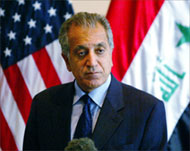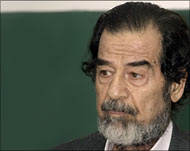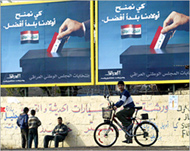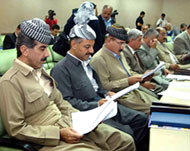Top Sunnis reject draft Iraq charter
Five top Sunni Arabs in Iraq’s government have spoken out against the draft constitution proposed by Shia and Kurds as Sunni negotiators submitted counter-proposals on the document.

The statement on Saturday by the five delivers a major blow to last-minute efforts to craft a document that can win the backing of all ethnic and political groups in the country.
Their comments also come shortly after Sunni negotiators offered their own proposals on the deal-breaking issues of federalism and the fate of former ruling party members as US diplomats worked furiously to mediate a deal on the eve of a parliament session to sign off on the draft.
US officials pressed the Shia, Kurdish and Sunni Arab delegations to reach a consensus so the National Assembly can be presented a document acceptable to all – enhancing chances for easy approval by voters in a 15 October referendum.
Shia and Kurd leaders already accepted the draft, but parliamentary approval over objections by the Sunni minority would be a severe blow to US President George Bush’s hopes that a new constitution will draw Sunnis from the anti-American battle by armed fighters and hasten the day US troops can go home.
Final offers
 |
|
Zalmay Khalilzad met negotiators |
There was no comment on the new Sunni proposals from Shia and Kurds, who said compromises on federalism and purging Baath Party members that they submitted on Friday were their final offers.
Sunni negotiators said on Saturday that those revisions were unacceptable.
US ambassador Zalmay Khalilzad met various negotiators and parliament’s Sunni speaker, Hajim al-Hassani, late on Saturday trying to broker wording acceptable to the Sunnis.
But prospects for a compromise dimmed when four Sunni Arab members of the cabinet and a Sunni deputy prime minister declared that they objected to 13 provisions in the draft – more points than Sunni negotiators cited in talks on Friday.
Objections
The statement was issued by Culture Minister Nouri Farhan al-Rawi, Minister of State for Women’s Affairs Azhar Abdel-Karim, Minister of State for Provincial Affairs Saad al-Hardan, Industry Minister Osama al-Najafi and Deputy Prime Minister Abed Mutlaq al-Jbouri.
 |
|
Sunnis want all reference to |
Among other things, the five Sunnis objected to measures reserving government posts for members of specific religious groups, demanded postponement of any decision on federalism, wanted all references to Saddam Hussein’s Baath Party removed and insisted the constitution identify Iraq as an Arab – and not just an Islamic – country.
Although the five were not directly involved in the negotiations, the statement was significant because of their stature in the community.
If Sunnis of such rank find the draft objectionable, it is questionable whether supporters could sell the document to rank-and-file Sunni voters more influenced by radical clerics and vulnerable to threats by fighters.
Strong vote
Sunni Arabs account for only 20% of Iraq’s 27 million people, but they are in a strong position to derail the constitution.
If two-thirds of voters in any three provinces reject the charter in the referendum, the constitution will be defeated, and Sunnis have the majority in at least four provinces.
 |
|
Sunnis are in a strong position to |
Unless there are further changes, Sunni leaders said their people should oppose the charter peacefully by voting no in the referendum.
“We want you to express your point of view but without violence,” said the Sunnis’ chief negotiator Saleh al-Mutlaq.
In a bid to placate Sunnis, the US military announced on Saturday that nearly 1000 security detainees – virtually all believed to be Sunnis – had been released from Abu Ghraib prison the past several days. It was the largest release to date.
Iraqi police, meanwhile, said they freed an unspecified number of people arrested this week in the Madain area, 19km southeast of Baghdad.
Sunnis had complained the Shia-controlled police arrested dozens of Sunnis there to keep them from enrolling to vote in the constitutional referendum before the registration deadline this Thursday.
Legislature meeting
Al-Hassani, the parliament speaker, said he planned to convene the legislature on Sunday, but no hour was announced.
It was unclear whether the draft constitution would be put to a vote in the assembly, where Shia and Kurds hold 221 of the 275 seats.
 |
|
Kurds and Shia offered to put off |
The speaker said Shia and Kurds sought to address Sunni concerns by offering on Friday to put off consideration of federalism’s details until after a new parliament is elected in December, when Sunnis are expected to expand on the 17 seats they won on 30 January after many Sunnis boycotted that vote.
Shia and Kurds also acknowledged that many members of Saddam’s party were not criminals and would not be covered by a charter provision on purging Baathists from government and public life, al-Hassani said.
Sunni negotiator Fakhri al-Qaisi said his side saw no “essential change” in those areas and submitted their own proposed wording.
Shia negotiator Ali al-Adeeb insisted his group offered major concessions.
Rejection of draft
Opponents of the constitution within both the Sunni and Shia communities rejected the draft even before it was finalised.
“We consider this draft as a next step of this process which does not represent the peoples’ will” Alliance of Sunni Association of Muslim Scholars and Shia leader Muqtada al-Sadr’s movement |
An alliance including the Sunnis’ Association of Muslim Scholars and the movement of Shia cleric Muqtada al-Sadr condemned a “political process which had been led by occupiers and their collaborators”.
“We consider this draft as a next step of this process which does not represent the peoples’ will,” the group declared.
Sunnis fear that federalism, demanded by Shia and Kurds, not only would establish a giant Shia state in the south but also encourage Kurds to try to expand their self-rule region into northern oil-producing areas.
Sunnis resent attempts to ban former Baath Party members because they believe that would deprive them of a livelihood and prevent Iraq from using the talents of thousands of professors, senior executives and others who joined the organisation to advance their careers.
However, Shia and Kurds suffered under Saddam, and hatred for the Baath Party runs deep.